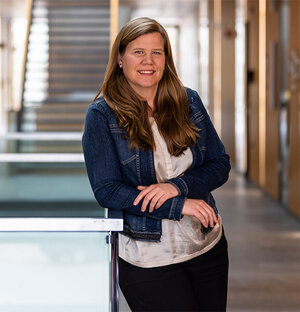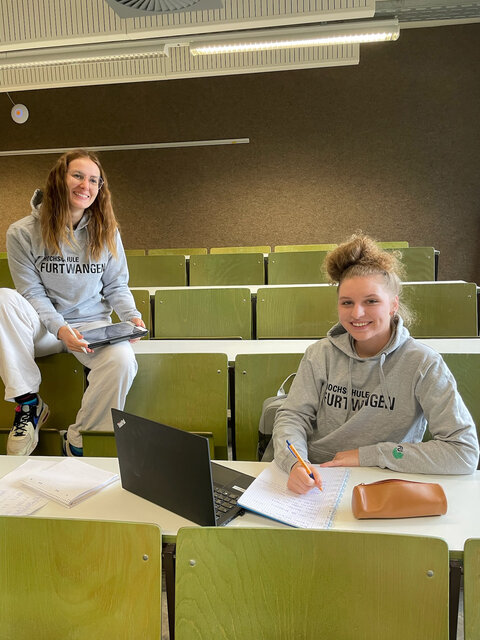A career with security
In this master's degree programme, you'll be taught in-depth engineering know-how in risk analysis and risk assessment over three semesters. In addition to the master's degree, you can also obtain the additional qualification of "Specialist Planner for Preventive Fire Protection".
Explore the engineering interfaces between security, occupational safety, environmental protection, fire protection, IT security and management and train as an expert in risk engineering. As a risk engineer, you can contribute to improving safety, health, the environment and people's quality of life.
Programme content and structure
The course content covers the following core areas:
- Modeling
- Risk assessment
- Simulation
A large number of procedures for risk assessment are based on fundamental methods. The programme teaches the fundamental approaches to risk assessment. Building on this, case-related variants, for example quantitative, qualitative and numerical methods, are learned. Another focus is the modeling and simulation of risk scenarios and the derivation of protection concepts.
Entry requirements
The course is suitable for those who are interested in the risk analysis of complex technical and socio-technical systems and have a bachelor's degree in a technical or engineering field, for example in process engineering, mechanical engineering or industrial engineering. The course is taught partly in English, so in addition to good German proficiency (DSH 2 or TestDaF with TDN 4), English proficiency at CEF level C1 or higher is also required.
RIW specifics
The focus of the master's programme is methodological competence. Quantitative and qualitative risk analysis, technical and functional safety, risk assessments and also resilience engineering are examined from different perspectives and contexts in order to convey a comprehensive understanding of the existing methods and approaches.
This means you will be able to apply well-known, classic analysis, assessment and treatment methods to problems, and can also combine suitable aspects from a wide range of methods.
Special features
Many of our students complete their studies part-time in order to gain additional practical experience in various areas of security. Our students also often write their master's theses in cooperation with a company, public authority or research institution. For example, our part-time students have worked as external service providers in the fields of occupational health and safety and data protection, were safety engineers at a major institution and were involved in security research. The different experiences and current problems that the students and professors bring to the lectures and seminars make them particularly lively and instructive.
Feel free to contact us to find out what part-time study could look like for you.
Your career prospects
Jobs with lots of responsibility
Many career opportunities are open to our graduates. With a Master in Risk Engineering, you can start out in management positions, e.g. with plant and professional fire departments, in corporate security or with hazard prevention authorities. You can also work as an expert, for example for insurance companies, in fire protection or as an IT expert. By integrating sustainability principles into risk assessment, risk management and decision-making, you will help to ensure a safe and sustainable future in the long term.
Your key contacts
We'll answer any questions you have about your Safety and Security programme!

Dean of Studies:
Security & Safety Engineering Bachelor (BSc) (SSB)
Risk, Reliability and Safety Engineering (MSc) (RIW)

Security & Safety Engineering Bachelor (BSc) (SSB)
Risk, Reliability and Safety Engineering (MSc) (RIW)

![[Translate to English:] Seminar](https://www.hs-furtwangen.de/fileadmin/_processed_/a/1/csm_GSG-RIW_IMG-3462_7bb97766c7.jpg)
![[Translate to English:] Grafik einer Batteriebrand-Simulation](https://www.hs-furtwangen.de/fileadmin/_processed_/5/9/csm_GSG-RIW_Batteriebrand_702f51ca54.jpg)
![[Translate to English:] Vier Personen stehen vor der Tafel und schreiben](https://www.hs-furtwangen.de/fileadmin/_processed_/9/8/csm_GSG-RIW_IMG-1384_8fa767edb5.jpg)
![[Translate to English:] Grafik: Entfluchtung](https://www.hs-furtwangen.de/fileadmin/_processed_/2/7/csm_GSG-RIW_Entfluchtung_01_c864e9ad1e.jpg)
![[Translate to English:] Entfluchtung](https://www.hs-furtwangen.de/fileadmin/_processed_/a/0/csm_GSG-RIW_Entfluchtung_02_f05619be02.jpg)
![[Translate to English:] Grafik: H2-Freisetzung und Abschaltung](https://www.hs-furtwangen.de/fileadmin/_processed_/f/f/csm_GSG-RIW_H2-Freisetzung_und_Abschaltung_d0865b96fc.jpg)
![[Translate to English:] Zwei Personen im Hörsaal](https://www.hs-furtwangen.de/fileadmin/_processed_/9/b/csm_GSG-RIW_IMG-6209_d4f2cb0f0c.jpg)
![[Translate to English:] Seminar](https://www.hs-furtwangen.de/fileadmin/_processed_/0/c/csm_GSG-RIW_IMG-6361_7e63cc84a8.jpg)
![[Translate to English:] Gruppenarbeit](https://www.hs-furtwangen.de/fileadmin/_processed_/1/4/csm_GSG-RIW_IMG-8168_23bd68885b.jpg)
![[Translate to English:] Grafik: Brandschutz-Simulation](https://www.hs-furtwangen.de/fileadmin/_processed_/3/4/csm_GSG-RIW_Simulation_Brandschutz_c979f35c7b.jpg)